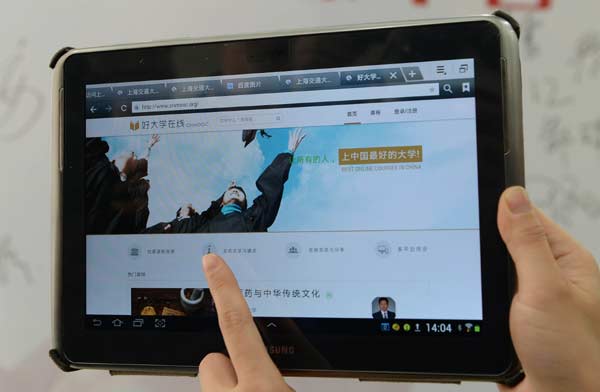Online education a new frontier in China
 |
|
The online education market was valued by iResearch Group at 83.97 billion yuan ($13.6 billion) in 2013. [Photo provided to China Daily] |
Online education may have great potential in China, a country where many parents offer all they can to provide the best education for their children.
The online education market was valued by Internet consultants iResearch Group at 83.97 billion yuan ($13.6 billion) in 2013.
There's an "increasing number of Internet users in China," Liu Dongmei, an analyst with iResearch, said. More of them are getting used to online classes and the number of learners in China is expected to grow from 67.2 million in 2013 to 120 million in 2017, Liu said.
"On one hand, Internet technology can help students enjoy the flexibility to learn whenever and wherever they want," Liu said.
"On the other hand, the content for online education is expected to be enriched with the increasingly diversified needs from students. Apart from getting the same lessons offered by traditional schools, people can learn a wide range of things online, either for vocational skills such as Photoshop or personal interest, such as guitar playing."
China lacks neither students nor teachers, she said. But how to match what teachers offer with students' online needs is a challenge faced by many platforms at the moment.
"There are many unsolved questions for online education platforms, such as a successful business model and people's willingness to pay for online lessons. But to push enough teachers and students online is the top challenge," Liu said.
To aggressively carve a market share, YY's 100.com plans to provide basic training for TOEFL and IELTS for free. Such prep classes for the two exams have been of the most profitable for many private education services in China. To attract even more students, 100.com promised to give 100 yuan to students who complete an online course.
To support their aggressive plan, YY said they will invest 1 billion yuan in the next two years on online education. The move may shake New Oriental's No 1 position, which has been the must-go school for Chinese students who want to study abroad.
YY CEO Li said teachers can gain more compared with working at a brick-and-mortar school where running costs are quite high.
"You need to build classrooms and get all the equipment and supplies. Not to mention, there is also the cost for management," Li said.
"The cost of running an online school is not that high. We don't need everyone to pay for their online courses and we intend to give the majority of the earnings to teachers," he said. More teachers may become entrepreneurs and set up their own online educational business, he said.
















